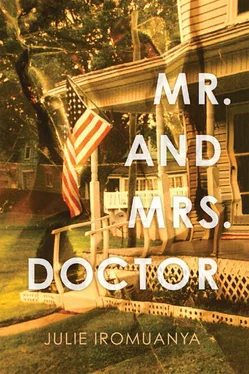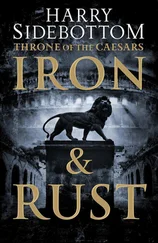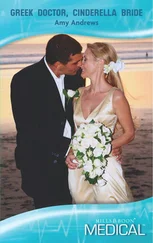Ifi was silent. Softly, she said, “You promised. We’ll open a hospital. I will be the nurse, and you will be the doctor.”
As he drifted back to reality, Job felt the air let out of his balloon. “We will,” he said, a whisper.
“But not today,” she said with finality.
“Not today.”

Naked from the waist up, Job straddled a white wall. The camera bulb flashed, capturing the bruises all along his body. A black whorl spewed from his chest, another near his ribs, where the boys had kicked him. Several swollen knots rose on his back. Each time the bulb flashed, Job flinched. He was humiliated. Not because of the cameras, but because of the cold, clinical gaze of the eyes inspecting each part of his body, as if he were a lab rat. He couldn’t be here feeling this, so in his mind, he retreated to an image of him standing before a patient, dressed in his lab coat, recording numbers on a chart.
This would not have happened in Nigeria. I am respected. I am Mr. Doctor. Again, his stomach went rigid with anger. They will pay, he decided. Job imagined the three boys in a lineup. He saw himself identifying them as he’d seen it done in many movies. From behind a glass screen, he eyed their hardened glares. He pointed to the first, the boy with sleepy eyes, then the mouth flaky with potato chips, then the boy with cigarette ash for breath. They will never make me afraid, he decided. He would have them locked up for the rest of their natural lives. He would say whatever he needed to say to make sure they never saw the light of day. They would sit on the bottom of a cold cell, and he would spit on them from above. He decided on a sum for the distress that he would claim at the time of his civil lawsuit, because surely he would sue the three boys and their families for everything they were worth.
And then he would take their money and resume his classes, somewhere expensive and prestigious like Harvard or Yale. He could see himself presiding over the groundbreaking ceremony for his clinic in his father’s village. He could see himself with Ifi, his assistant, standing alongside him in her nurse’s uniform, their three children, all boys, alongside them. He could see himself in black pants, a white lab coat, a tie, a briefcase, a stethoscope. This will all be worth it in the end, he assured himself. After all, this is America.
“I took your photographs and filed the report,” Job said to the photographer, a frail man with bulging eyes. “Where is my car? I’ll be late for work.”
“Listen, call them and tell them you’ll be a little late. You need to be treated first.”
A physician’s assistant began the process, a younger woman with a doughy face fixed in place by thick glasses. “Ice on and off for twenty minutes,” she said of the bruises and bumps. “Most of these lacerations are superficial, except this one. This one needs stitches, but you’ve waited too long.” With her gloved hand, she rubbed an antiseptic ointment across the gash and applied butterfly bandages to it. “Keep it clean and dry. You’ll have an ugly scar, but you’ll live.”
Job slipped his shirt, tie, and jacket back on. A knock at the door jolted him to attention. A wide-bottomed officer with square teeth split by a gap waddled in and spoke to him. “We just need you to clarify a few details.”
“Where are you taking me? I gave you my report.”
Panting and wobbling the whole way, he hurried Job down the hall to an airless room. Two hard plastic chairs were angled around a table. Only after Job sat did the officer take a seat across from him, and in that moment Job had just enough time to take in the man’s massive rear, his unzipped fly, and the sweat stains at his armpits. Not exactly the image Job had in mind of the long arm of the law. Instantly, he recognized that any chance he had for justice would not happen today, not in the hands of such a man. Job’s sense of righteousness turned to disappointment, and finally anxiety.
His words tumbled out of him. “Three black Americans attacked me. I was not finding any trouble, and these three black Americans beat me.” Before the man had a chance to say a word, Job began with his description. “They had cornrows and women’s hose like this covering their hair. They walked like this.” He began to ape their swinging steps. “They wore trousers like this.” Job pulled his down just low enough so that the top of his underpants was exposed. “But you see, they wore boxer pants and big coats, like thieves.”
“So they were African American, like you?”
“Yes. I mean no. Not African American. I am not African American. I am from Africa. I am a citizen. I am an American, but I am no African American.”
“I see.” In apparent confusion, the officer frowned. “But they were black, though. Black like you?”
“No. Not like me.”
“Were they my color then?”
“No.” Job glared at the officer’s pale pinkish flesh. Then his. He stared for a long time. “They were this color. One maybe a little lighter. Two maybe the same.”
“Black, like you.”
After a moment, Job gulped. His eyes fixed on the officer’s open fly. He wanted badly to reach forward and yank the zipper up, to teach this insolent man something about what it meant to be a professional, to walk like a man. But there was nothing. He couldn’t think of a single word to describe the boys, other than akatta, a word the officer would never understand. “Yes, they were my color, but no, not like me.”
“I see.” The officer scrawled some things on his pad. “There’s just one thing I’m unclear about. You said earlier that they didn’t take your money. They didn’t even take your wallet. But they took your car.”
Job thought it over. With anger, he decided, once again, I will make them pay. “They didn’t take my wallet,” he paused, and the lie tumbled out. “But they took my money.”
“Now they took your money. An hour ago they only took your car.”
Sweat built on Job’s brow, and it stung against his raw face. “I said they took my money, my car, and they beat my face.”
“So they took your money and your car and then they assaulted you, Mr. Og-ban-ooya? In that order?”
“Yes.”
“Why?”
“I don’t know.”
“Tell me, does this make any sense even to you? Again: they took your money, your car, and then they just suddenly decided to return and attack?”
Job felt it slipping away. A deep breath steadied him. “They beat me. Then they took my money and car. They did not want my wallet. They threw it at me.”
“I see, Mr. Og-ban-ooya. And how much money did you have on you? Ten dollars? Twenty?”
Job’s voice was suddenly low. “Are you accusing me of lying?”
For a long, silent moment, the officer looked him over. “I’m gonna ask you one final thing. Just answer as completely and honestly as you can, and we’ll let you go.”
“Let me go? Am I the victim or the assailant?”
“Mr. Og-ban-ooya.”
“Doctor.”
“ Doctor. ” There was a sardonic ring to his tone.
“Yes, Doctor.”
“Dr. Og-ban-ooya. Did you have any drugs or paraphernalia in your possession at the time of the. .” He paused. “Assault.”
“You are asking if I am a drug dealer?”
The officer’s eyes remained unmoved. “Did you know the assailants?”
Job quivered. “You do not believe.” He swallowed. Words were a tumble in his mind. He started from the beginning. He started from the beginning of what the boys looked like; he started way in the beginning, when he had no more years than the boys who attacked him, when he came here on his own with nothing but his father’s tuition money and two suitcases. Then he started at the beginning of that night. He needed to tell the man about arriving at the gas station, about the ball of clothes under the seat of his car, but to tell the officer that, he must tell him about his clandestine retreats to the parking lot, where he changed his clothes each night and every morning so that his wife would not know, so that the world would not know. And to say this, he must describe the failure he suddenly felt, realizing for the first time that he would never be a doctor.
Читать дальше













